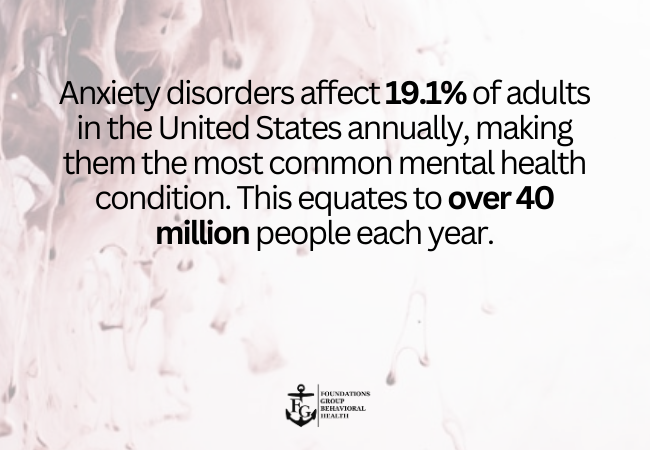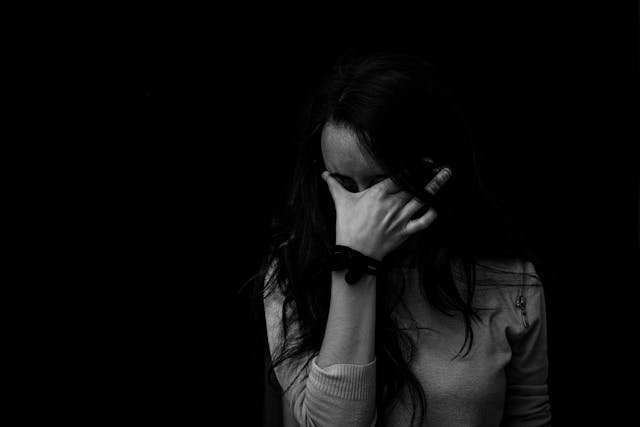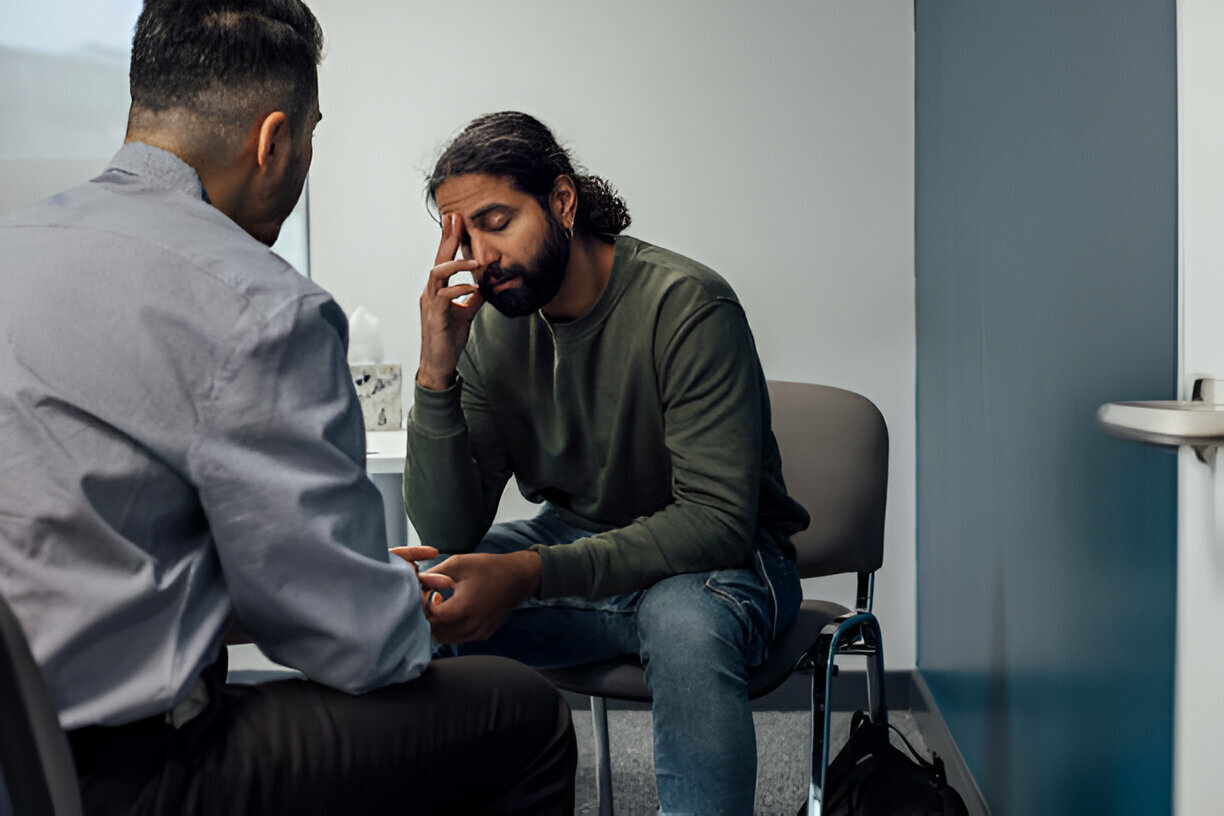Anxiety disorders are among the most common mental health conditions, affecting over 40 million adults in the United States annually. These disorders can range from mild, manageable symptoms to severe, life-disrupting conditions. Effective treatment depends on the level of care needed, which varies based on the intensity and impact of symptoms.
At Foundations Group Behavioral Health, we offer a comprehensive array of services tailored to meet each individual’s unique needs. Our evidence-based Behavioral Health Treatment Programs empower individuals to regain control of their lives, providing compassionate care at every stage of their recovery journey.
This article will explore the levels of care available for anxiety disorders, their benefits, and how to choose the right one for your needs.
What Are Anxiety Disorders?
Anxiety disorders encompass a range of mental health conditions characterized by excessive fear, worry, or nervousness. While occasional anxiety is a normal response to stress, anxiety disorders involve persistent and intense feelings that interfere with daily life.
Common types of anxiety disorders include:
- Generalized Anxiety Disorder (GAD): Chronic worry about everyday issues.
- Social Anxiety Disorder: Intense fear of social situations.
- Panic Disorder: Recurrent panic attacks with overwhelming physical and emotional symptoms.
- Phobias: Specific fears of certain objects, situations, or activities.
- Obsessive-Compulsive Disorder (OCD): Unwanted, repetitive thoughts and behaviors.
Symptoms of anxiety can manifest physically (e.g., rapid heartbeat, sweating) and emotionally (e.g., irritability, difficulty concentrating). Because anxiety often co-occurs with other conditions like depression, tailored treatment is essential.
Signs That You May Need Professional Help
While occasional anxiety is normal, it’s essential to recognize when anxiety becomes a disorder requiring professional help. Some key signs include:
- Persistent Worry or Fear: Feeling anxious most days for six months or more.
- Physical Symptoms: Frequent headaches, muscle tension, or gastrointestinal issues without a medical cause.
- Avoidance Behaviors: Avoiding places, people, or activities to prevent anxiety triggers.
- Impact on Daily Life: Difficulty concentrating at work or school, trouble maintaining relationships, or neglecting self-care.
- Co-Occurring Issues: Experiencing depression, substance abuse, or other mental health challenges alongside anxiety.
Levels of Care for Anxiety Disorders
1. Psychiatric Day Treatment
This intensive program is ideal for individuals experiencing moderate to severe anxiety symptoms. Psychiatric day treatment provides structured care during the day, combining therapy, skill-building, and psychiatric evaluation.
- Features:
- Individual therapy to explore root causes and triggers.
- Group counseling sessions to build social and emotional skills.
- Psychiatric evaluations and medication management, if needed.
- Who it’s for:
Individuals requiring more support than outpatient care but not hospitalization.
2. Half Day Treatment Program
Designed for those transitioning from intensive programs or managing mild-to-moderate symptoms, this flexible program balances structured care with personal commitments.
- Features:
- Morning or afternoon sessions focusing on targeted therapy.
- Skill-building workshops to reduce anxiety symptoms.
- Lifestyle coaching, including relaxation techniques and mindfulness practices.
- Who it’s for:
Individuals needing continued support with reduced intensity.
3. Outpatient Mental Health Program
This program is a step down in intensity and is ideal for managing anxiety symptoms over the long term.
- Features:
- Regular therapy sessions to address ongoing challenges.
- Continued development of coping skills through CBT and mindfulness-based approaches.
- Integration of therapy into daily routines.
- Who it’s for:
Those with mild symptoms or those transitioning from higher levels of care.
4. Depressive Disorder Treatment Program with Anxiety Support
Anxiety and depression frequently co-occur. Our Depressive Disorder Treatment Program is designed to address both conditions through integrated care.
- Features:
- Dual-focused therapy to manage overlapping symptoms.
- Group sessions promoting shared experiences and solutions.
- Medication management to address mood imbalances.
- Who it’s for:
Individuals experiencing anxiety alongside depressive disorders.
5. Anxiety Treatment Program
Specifically focused on anxiety disorders, this program provides personalized care to address the unique challenges of anxiety.
- Features:
- Cognitive Behavioral Therapy (CBT) to reframe anxious thoughts.
- Exposure therapy to reduce sensitivity to triggers.
- Lifestyle guidance, including sleep hygiene and nutrition.
- Who it’s for:
Individuals requiring specialized care for anxiety management.

Common Types of Therapies for Anxiety Disorders
Anxiety disorders are highly treatable with evidence-based therapeutic approaches tailored to individual needs. Some effective therapies include:
- Cognitive Behavioral Therapy (CBT): A structured, goal-oriented therapy that helps reframe negative thought patterns contributing to anxiety.
- Exposure Therapy: Gradual, controlled exposure to anxiety triggers to desensitize and reduce avoidance behaviors.
- Dialectical Behavior Therapy (DBT): Teaches skills like emotional regulation and distress tolerance, particularly for severe anxiety.
- Mindfulness-Based Stress Reduction (MBSR): Incorporates mindfulness techniques to help individuals focus on the present and reduce stress.
- Group Therapy: Provides a supportive environment to share experiences and learn coping strategies from peers.
How Anxiety Disorders Impact Daily Life
Untreated anxiety can significantly affect a person’s quality of life, causing issues such as:
- Difficulty maintaining personal and professional relationships.
- Impaired performance at work or school due to lack of focus.
- Physical health problems, including heart disease and weakened immunity.
By seeking timely and appropriate treatment, individuals can regain control and prevent these long-term effects.
The Role of Lifestyle in Managing Anxiety
Lifestyle changes play a significant role in managing anxiety and improving overall mental health. While professional therapy and treatment programs are vital, adopting healthy habits can complement and enhance recovery efforts:
- Exercise Regularly: Physical activity releases endorphins, which help alleviate stress and boost mood.
- Practice Sleep Hygiene: Maintain a consistent sleep schedule and create a calming bedtime routine to improve sleep quality.
- Adopt a Balanced Diet: Consuming nutrient-rich foods can help stabilize mood and energy levels.
- Engage in Relaxation Techniques: Activities like yoga, meditation, and deep breathing reduce the physical symptoms of anxiety.
- Limit Stimulants: Reducing caffeine and alcohol intake can prevent heightened anxiety.
- Build a Support Network: Connecting with family, friends, or support groups provides emotional stability and encouragement.
Benefits of a Comprehensive Treatment Approach
At Foundations Group Behavioral Health, we emphasize the importance of tailored, evidence-based care. Our Behavioral Health Treatment Center in Massachusetts offers a safe and supportive environment for healing.
Why choose us?
- Personalized Treatment Plans: Every individual’s experience with anxiety is different, and we customize care accordingly.
- Evidence-Based Therapies: Our programs incorporate proven methods such as CBT, dialectical behavior therapy (DBT), and exposure therapy.
- Multidisciplinary Team: Our experienced professionals include therapists, psychiatrists, and support staff.
- Continuum of Care: From psychiatric day treatment to outpatient services, we offer a full spectrum of support.
When to Seek Help for Anxiety Disorders
Signs that it’s time to seek professional help include:
- Anxiety that interferes with daily life, work, or relationships.
- Symptoms persisting for six months or longer.
- Co-occurring conditions, such as depression or substance use.
Early intervention is key to preventing anxiety from escalating.
Take the First Step Toward Relief
If anxiety is controlling your life, know that help is available. At Foundations Group Behavioral Health, our compassionate team is here to guide you toward recovery. Whether through Psychiatric Day Treatment, Half Day Treatment Programs, or our specialized Anxiety Treatment Program, we’re committed to helping you find lasting relief.
FAQ on Levels of Care for Anxiety Disorders
What are the different levels of care for anxiety disorders?
The levels of care include Psychiatric Day Treatment, Half Day Treatment Programs, and Outpatient Mental Health Programs. Each level provides varying intensities of therapy and support based on the severity of symptoms.
How do I know which level of care is right for me?
The appropriate level of care depends on the severity of your anxiety symptoms, your ability to function daily, and any co-occurring conditions. A mental health professional can evaluate your needs and recommend the best treatment program.
What therapies are used in treating anxiety disorders?
Common therapies include Cognitive Behavioral Therapy (CBT), Exposure Therapy, Mindfulness-Based Stress Reduction (MBSR), and Group Therapy, all aimed at reducing anxiety symptoms and improving coping mechanisms.
Can anxiety disorders be treated without medication?
Yes, many individuals benefit from therapy, lifestyle changes, and support systems alone. However, medication may be recommended for more severe cases or when therapy alone is insufficient.
What role does lifestyle play in managing anxiety?
Healthy habits like regular exercise, proper sleep, and stress management significantly impact anxiety management. These lifestyle changes, paired with professional treatment, can enhance recovery outcomes.








